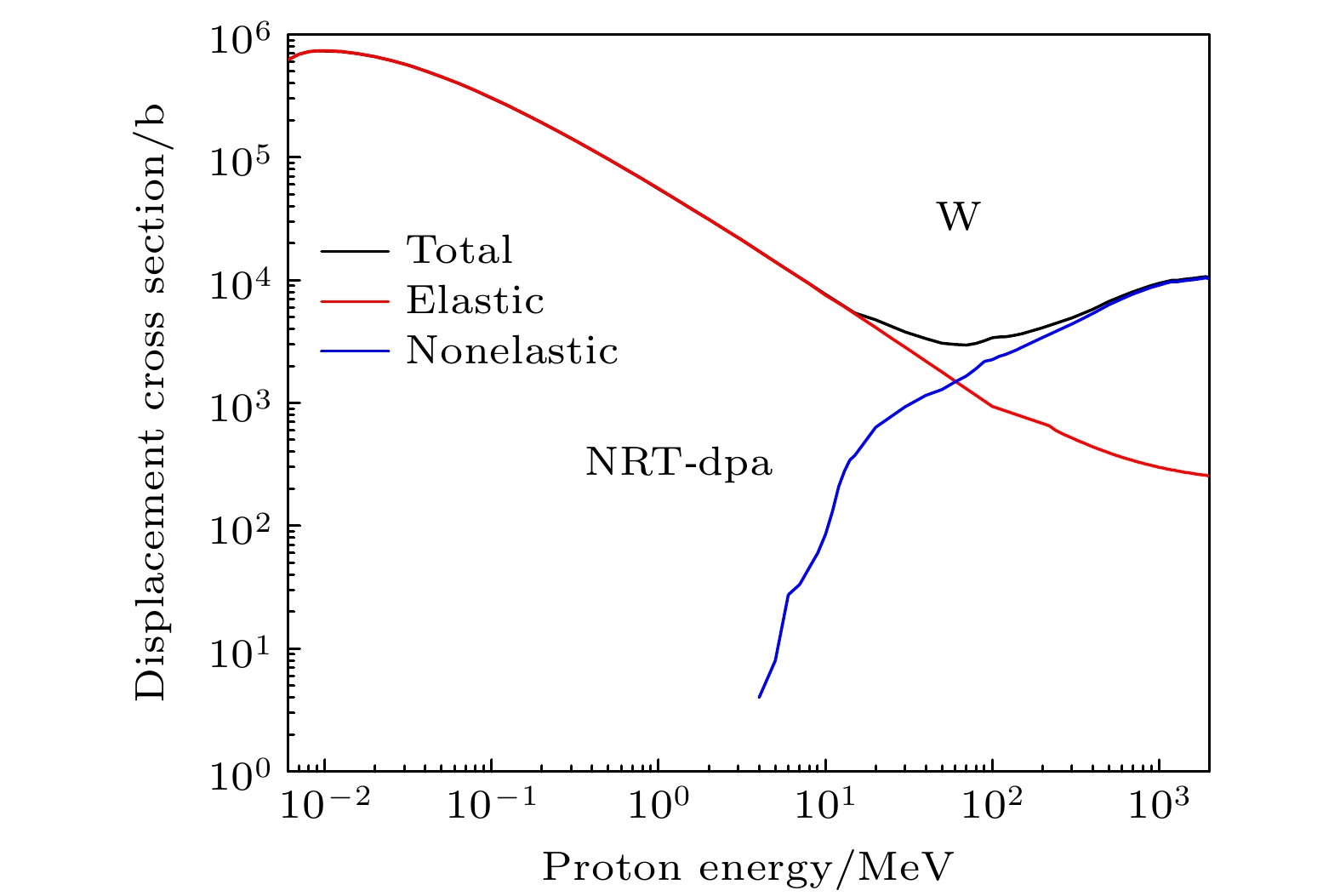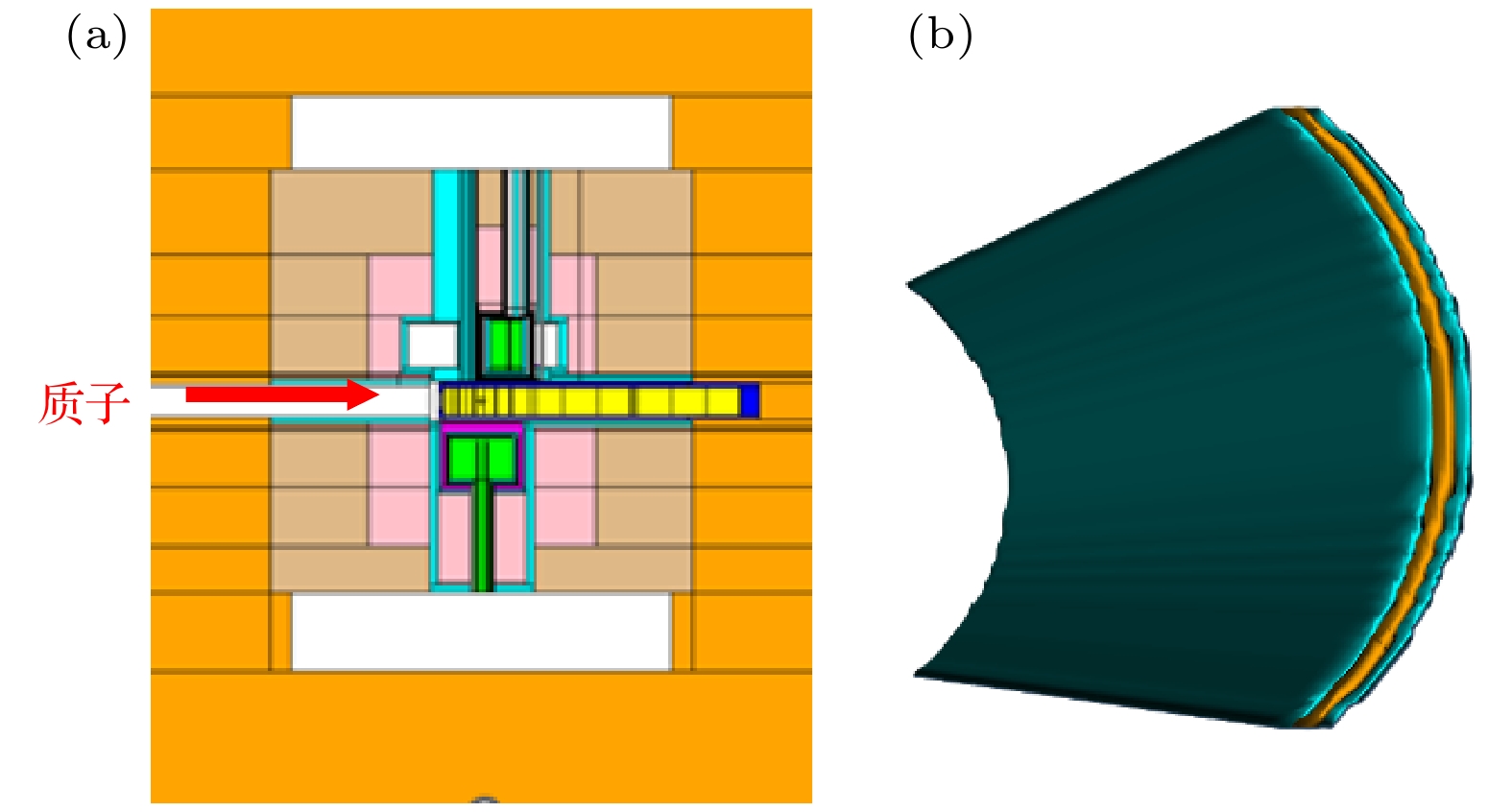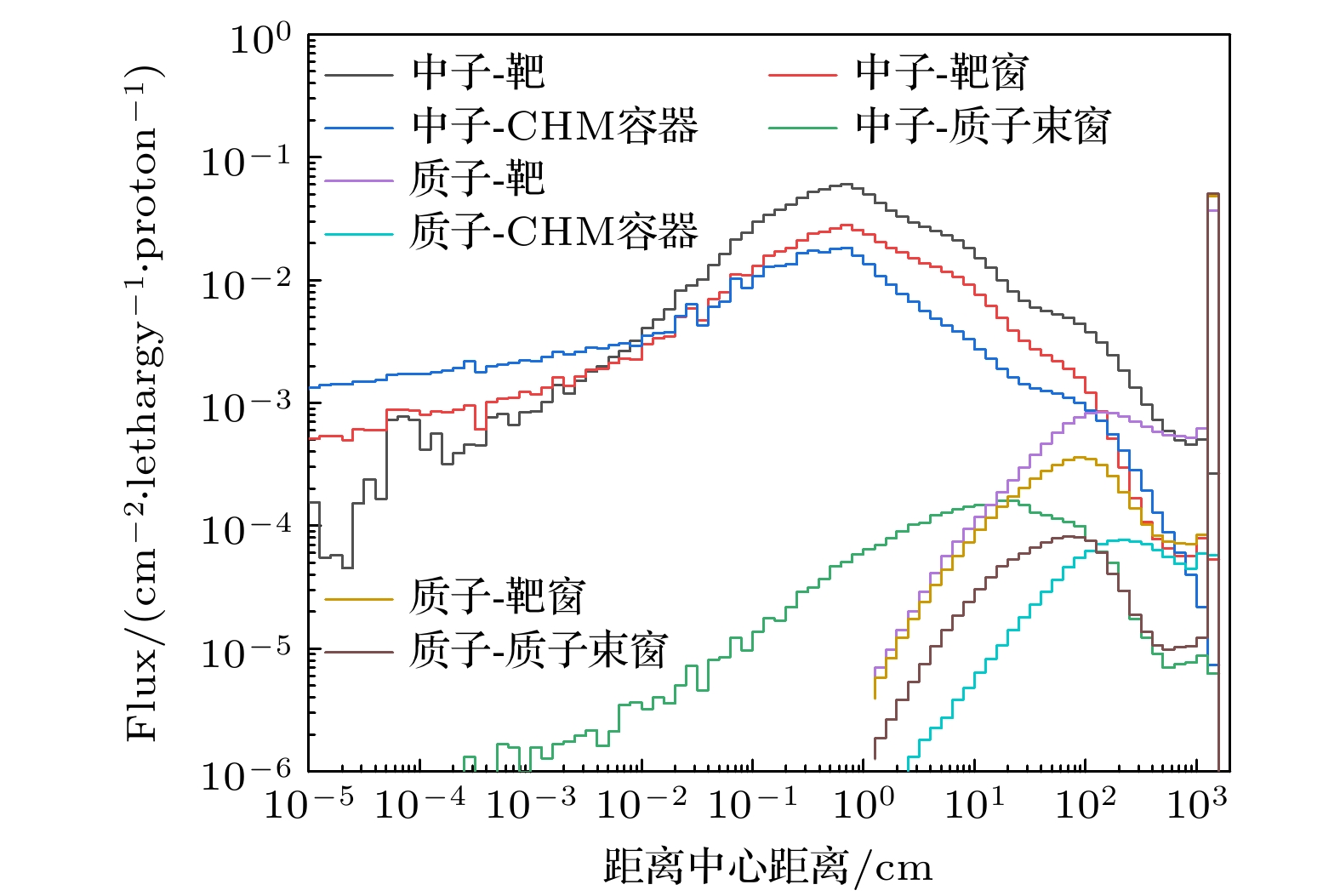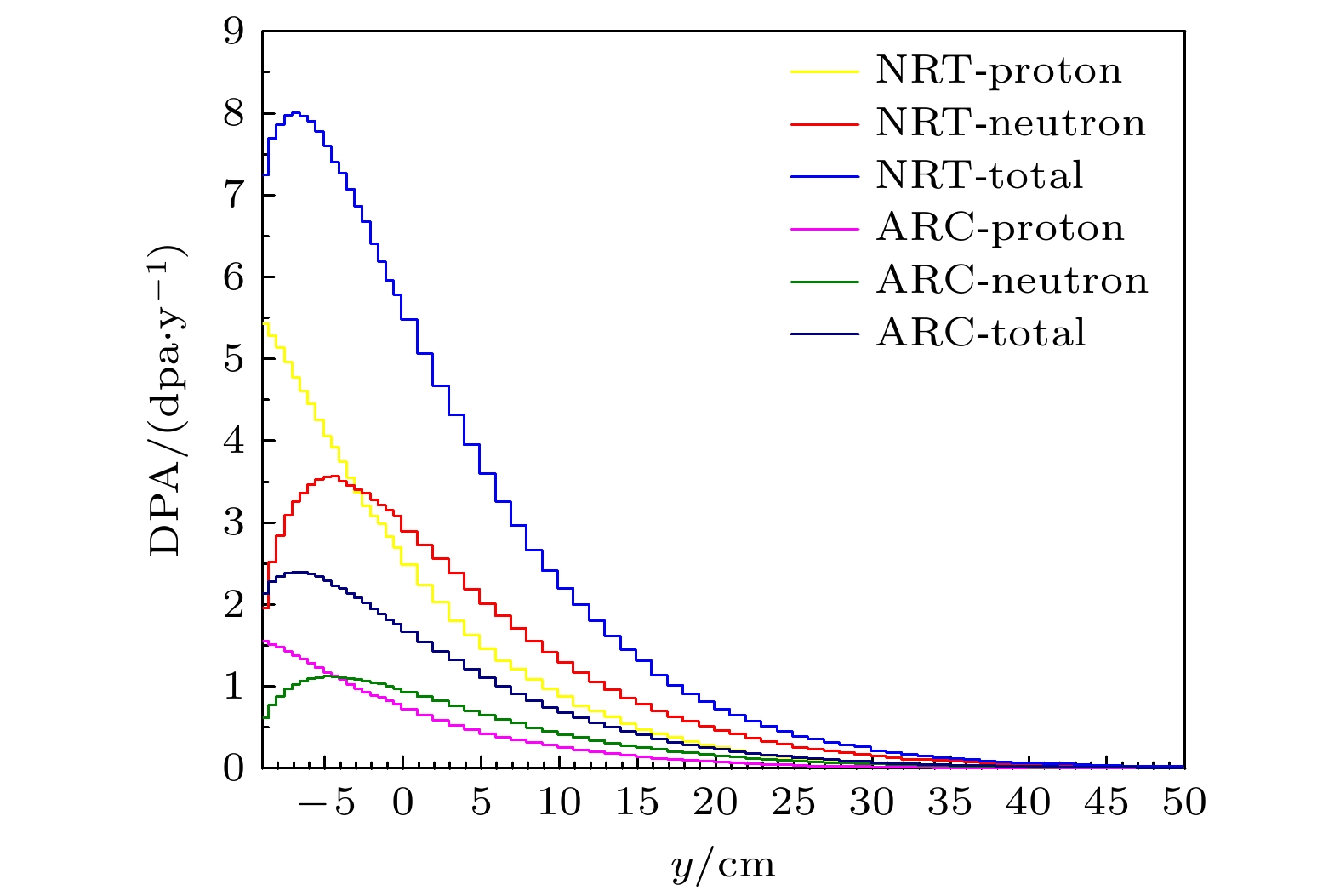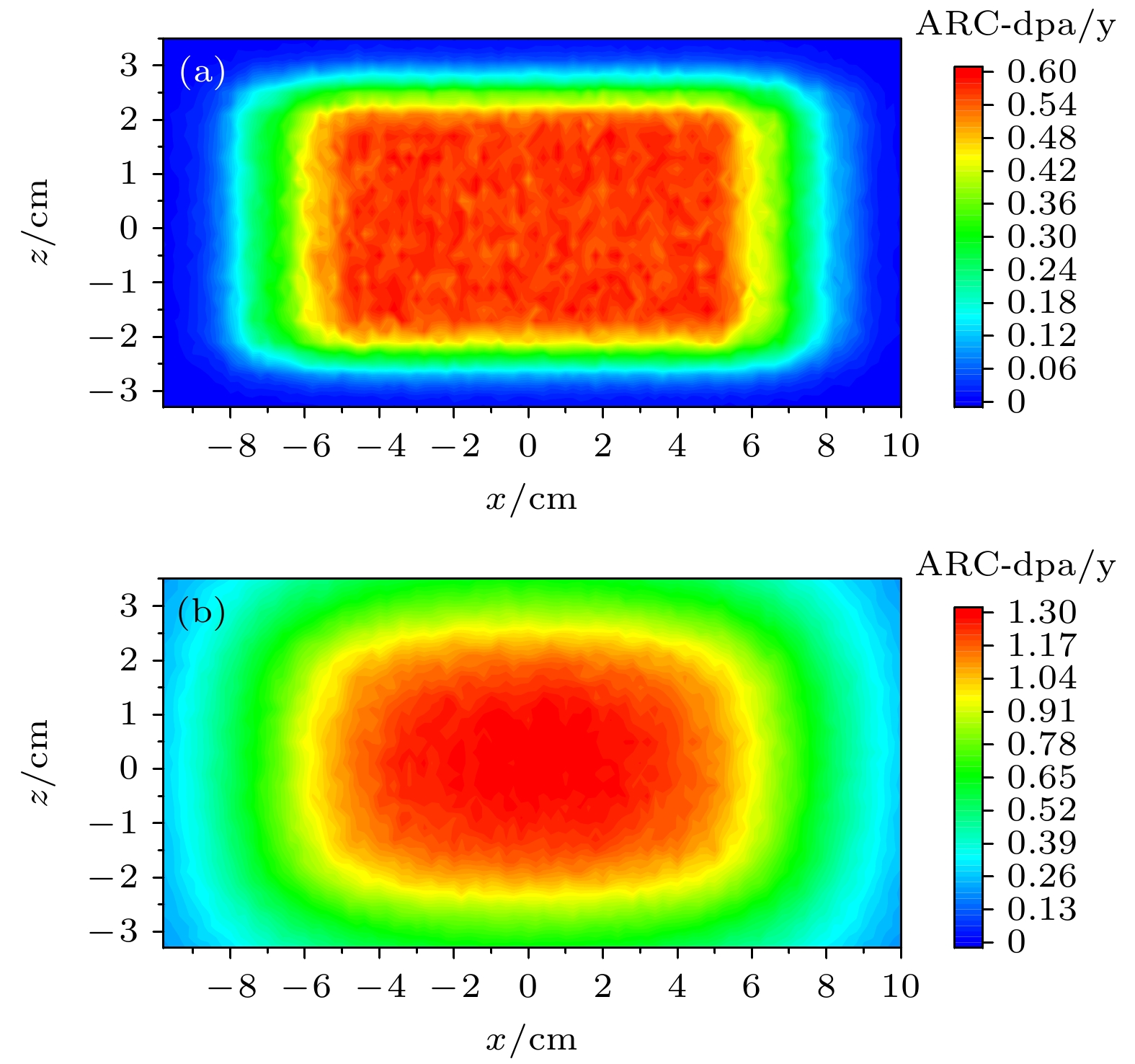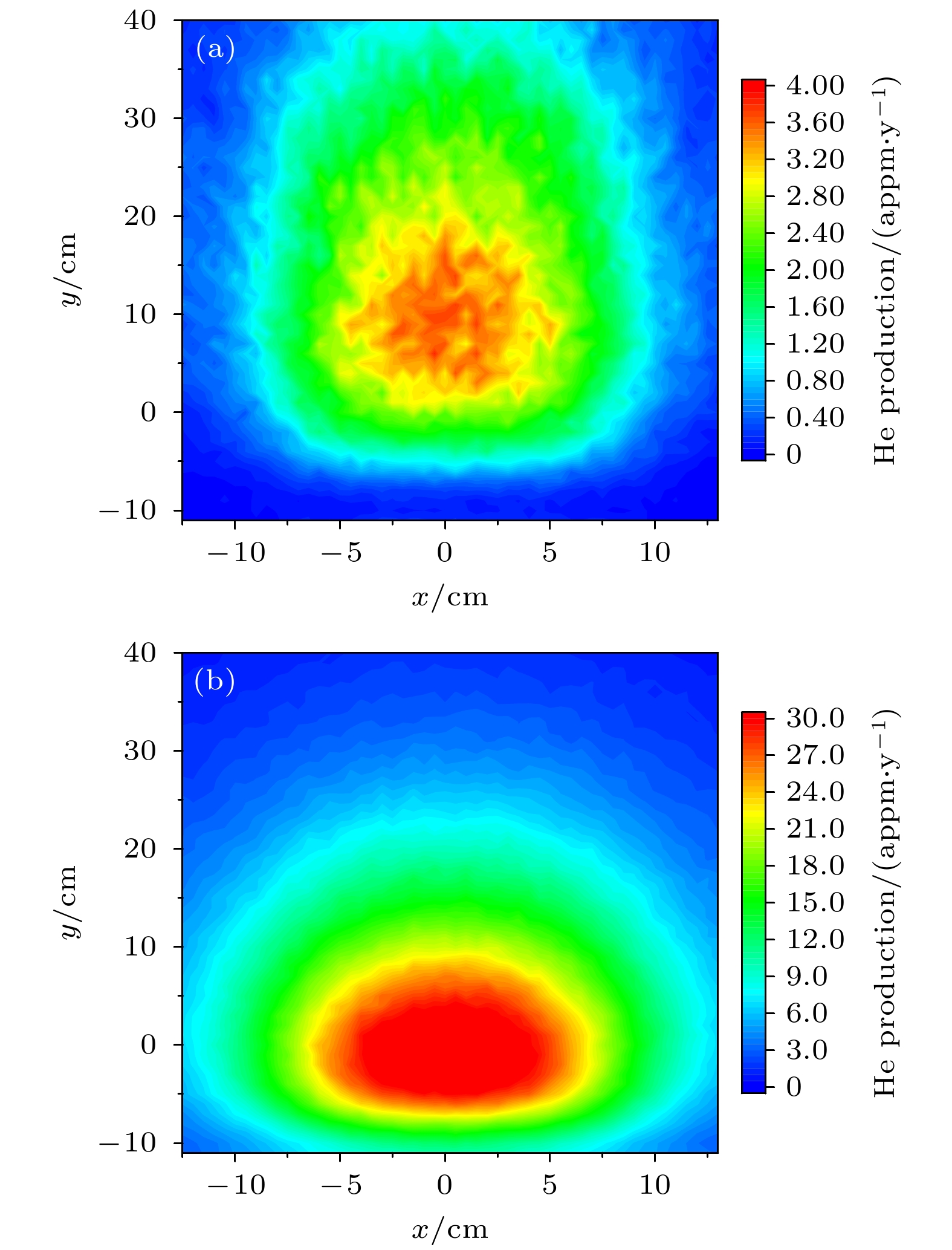-
中国散裂中子源一期工程于2018年通过国家验收, 当前束流功率已经达到140 kW. 为进一步提高靶站慢化器输出中子强度, 已经提出中国散裂中子源二期500 kW功率升级计划. 靶站关键部件长期受到高通量、高能量的粒子辐照, 会产生较强的辐照损伤, 影响着这些部件的使用寿命. 本文首先使用PHITS3.33程序计算了钨、SS316不锈钢、6061铝合金3种材料的质子和中子原子离位截面以及氢、氦的产生截面, 并分析了NRT (Norgett-Robinson-Torrens )模型和热平衡前原子复位修正(athermal recombination corrected, ARC)模型对材料离位损伤的影响. 在此基础上结合中国散裂中子源二期靶站基线模型计算了靶站关键部件在500 kW的束流功率下运行5000 h产生的原子离位次数(displacement per atom, DPA)以及氢、氦的产额. 计算结果表明, 钨靶受辐照后产生的NRT-dpa, ARC-dpa, H和He产额最大值分别为8.01 dpa/y (1 y = 2500 MW·h), 2.39 dpa/y, 5110 appm/y (atom parts per million, appm, 每百万原子中产生该原子的个数)和884 appm/y. 同样也计算了靶容器、慢化器反射体容器和质子束窗的辐照损伤值, 根据这些部件的辐照损伤值预估了各自的使用寿命. 这些结果对分析中国散裂中子源二期靶站关键部件的辐照损伤情况, 构建合理的维护方案有着十分重要的意义.
-
关键词:
- 中国散裂中子源二期靶站 /
- 辐照损伤 /
- ARC-dpa /
- PHITS模拟
China Spallation Neutron Source (CSNS) I project passed the national acceptance in 2018, and current beam power has reached 140 kW. In order to further improve the output neutron strength of the target station moderator, a 500 kW power upgrade plan has been proposed for CSNS II. The target station is an important part of the spallation neutron source. In the target station, a large number of neutrons are produced by the spallation reaction between high energy protons and the target, these neutrons are moderated by the moderator and become neutrons for neutron scattering experiments. During operation, the target and other key components such as the target container, the moderator reflector container, and the proton beam window are irradiated by high-flux and high-energy particles for a long time, which will result in serious radiation damage. It is important to assess the accumulated radiation damage during operation to determine the service life of each component. At present, the physical quantities used to evaluate the radiation damage degree of materials include displacement per atom (DPA), H and He production. In this work, the displacement damage cross sections of protons and neutrons and the H, He production cross sections for W, SS316 and Al-6061 materials are obtained by using PHITS. The effects of the Norgett-Robinson-Torrens (NRT) model and athermal recombination corrected (ARC) model on the calculation of displacement damage are analyzed. The results show that the cross section calculated based on ARC model is lower than that based on NRT model, because the NRT model does not take into account the resetting of the atoms before reaching thermodynamic equilibrium. On this basis, DPA, H and He production of the key components of the target station operating for 5000 h at a power of 500 kW are calculated by combining the baseline model of the second phase target station of the spallation neutron source in China. The results show that the yields of NRT-dpa, ARC-dpa, H and He produced by irradiation are 8.01 dpa/y (in this paper, 1 y = 2500 MW·h), 2.39 dpa/y, 5110 appm/y and 884 appm/y, respectively. The radiation damage values of the target vessel are 5.34 dpa/y, 1.92 dpa/y, 2180 appm/y and 334 appm/y, respectively. The radiation damage values of the moderators and reflectors are 3.78 dpa/y, 1.77 dpa/y, 124 appm/y, and 36.7 appm/y. The radiation damage values of the proton beam window are 0.35 dpa/y, 0.19 dpa/y, 962 appm/y, and 216 appm/y. Subsequently, the life of each component is estimated by analyzing the radiation damage. These results are very important for analyzing the radiation damage of these parts, and constructing reasonable maintenance programs.-
Keywords:
- target station of China Spallation Neutron Source II /
- radiation damage /
- ARC-dpa /
- PHITS simulation
[1] Wei J, Fu S N, Tang J Y, Tao J Z, Wang D S, Wang F W, Wang S 2009 Chin. Phys. C 33 1033
 Google Scholar
Google Scholar
[2] 于全芝, 殷雯, 梁天骄 2011 60 052501
 Google Scholar
Google Scholar
Yu Q Z, Yin W, Liang T J 2011 Acta Phys. Sin. 60 052501
 Google Scholar
Google Scholar
[3] Yin W, Yu Q Z, Lu Y L, Wang S L, Tong J F, Liang T J 2012 J. Nucl. Mater. 431 39
 Google Scholar
Google Scholar
[4] Simon G W, Denney J M, Downing R G 1963 Phys. Rev. 129 2454
 Google Scholar
Google Scholar
[5] Norgett M J, Robinson M T, Torrens I M 1975 Nucl. Engs. Des. 33 50
 Google Scholar
Google Scholar
[6] Broeders C H M, Konobeyev A Yu 2005 J. Nucl. Mater. 336 201
 Google Scholar
Google Scholar
[7] Broeders C H M, Konobeyev A Yu, Villagrasa C 2005 J. Nucl. Mater. 342 68
 Google Scholar
Google Scholar
[8] Konobeyev A Yu, Broeders C H M, Fischer U 2007 Proceedings of the 8th International Topical Meeting on the Nuclear Applications of Accelerator Technology (AccApp’07) Pocatello, Idaho, July 29–August 2, 2007 p241
[9] Konobeyev A Yu, Fischer U 2014 Proceedings of the HB 2014 East-Lansing, MI, USA, November 10–14, 2014 pTHO4AB02
[10] Nordlund K, Zinkle S J, Sand A E, Granberg F, Averback R S, Stoller R, Suzudo T, Malerba L, Banhart F, Weber W J, Willaime F, Dudarev S L, Simeone D 2018 Nat. Common. 9 1084
 Google Scholar
Google Scholar
[11] Konobeyev A Yu, Fischer U, Simakov S P 2018 Nucl. Instrum. Methods Phys. Res., Sect. B 431 55
 Google Scholar
Google Scholar
[12] Konobeyev A Yu, Fischer U, Simakov S P 2019 Nucl. Eng. Technol. 51 170
 Google Scholar
Google Scholar
[13] Herbach C M, Hilscher D, Jahnke U, Tishchenko V G, Galin J, Letourneau A, Péghaire A, Filges D, Goldenbaum F, Pienkowski L, Schröder W U, Tõke J 2006 Nucl. Phys. A 765 426
 Google Scholar
Google Scholar
[14] Barnett M H, Wechsler M S, Dudziak D J, Mansur L K, Murphy B D 2001 J. Nucl. Mater. 296 54
 Google Scholar
Google Scholar
[15] Lu W, Wechsler M S, Dai Y 2003 J. Nucl. Mater. 318 176
 Google Scholar
Google Scholar
[16] Meigo S, Ooi M, Harada M, Kinoshita H, Akutsu A 2014 J. Nucl. Mater. 450 141
 Google Scholar
Google Scholar
[17] Koning A J, Rochman D, Sublet J C, Dzysiuk N, Fleming M, Marck S 2019 Nucl. Data Sheets 155 1
 Google Scholar
Google Scholar
[18] Sato T, Iwamoto Y, Hashimoto S, Ogawa T, Furuta T, Abe S, Kai T, Tsai P, Matsuda N, Iwase H, Shigyo N, Sihver L, Niita K 2018 J. Nucl. Sci. Technol. 55 684
 Google Scholar
Google Scholar
[19] Konobeyev A Yu, Fischer U, Korovin Y A 2017 Nucl. Eng. Technol. 3 169
 Google Scholar
Google Scholar
[20] Yin W, Konobeyev A Yu, Leichtle D, Cao L Z 2023 J. Nucl. Mater. 573 154143
 Google Scholar
Google Scholar
[21] Lindhard J, Nielsen V, Scharff M 1968 Mat. Fys. Medd. Dan. Vid. Selsk. 36 3
[22] Jun I 2001 IEEE T. Nucl. Sci. 48 162
 Google Scholar
Google Scholar
[23] Burke E A 1986 IEEE T. Nucl. Sci. 33 1276
 Google Scholar
Google Scholar
[24] Boudard A, Cugnon J, David J C, Leray S, Mancusi D 2013 Phys. Rev. C 87 014606
 Google Scholar
Google Scholar
[25] Niita K 1995 Phys. Rev. C 52 2620
 Google Scholar
Google Scholar
[26] Furihata S 2000 Nucl. Instrum. Methods Phys. Res. B 171 251
 Google Scholar
Google Scholar
[27] Jung P 1983 J. Nucl. Mater. 117 70
 Google Scholar
Google Scholar
[28] Iwamoto Y, Yoshida M, Matsuda H, Meigo S, Satoh D, Yashima H, Yabuuchi A, Shima T 2021 Mater. Sci. Forum. 1024 95
 Google Scholar
Google Scholar
[29] Iwamoto Y, Yoshida M, Matsuda H, Meigo S, Satoh D, Yashima H, Yabuuchi A, Shima T 2020 JPS Conf. Proc. 28 061003
 Google Scholar
Google Scholar
[30] Greene G A, Snead C L, Finfrock C C, Hanson A L, James M R, Sommer W F, Pitcher E J, Waters L S 2003 Proceedings of the 6th International Meeting on Nuclear Applications of Accelerator Technology (AccApp’03) San Diego, USA, June 1–5, 2003 pp881–892
[31] Dai Y, Foucher Y, James M R, Oliver B M 2003 J. Nucl. Mater. 318 167
 Google Scholar
Google Scholar
[32] Chen J, Ullmaier H, Floβdorf T, Kuhnlein W, Duwe R, Carsughi F, Broome T 2001 J. Nucl. Mater. 298 248
 Google Scholar
Google Scholar
[33] Oak Ridge National Laboratory 2020 Spallation neutron Source Second Target Station Conceptual Design Report Volume 1: Overview, Technical experimental system S01010000-TR0001, R00
[34] Iwamoto Y, Meigo S, Hashimoto S 2020 J. Nucl. Mater. 538 1522
 Google Scholar
Google Scholar
-
表 1 SS316不锈钢、6061铝合金的核素组成
Table 1. Nuclide composition of SS316 stainless steel and 6061 aluminum alloy.
材料 核素原子数百分比 SS316 Fe (65.4%), Cr (17.0%), Ni (12.0%),
Mo (2.5%)
Mn (2%), Si (1%),
P (0.045%), C (0.03%)Al-6061 Al (98.2%), Mg (1.1%), Si (0.0057%) 表 2 部分元素的Ed, barc, carc参数值
Table 2. The Ed, barc, carc values of some elements.
元素 Ed/eV barc carc Mg 20 –1.00 0.45 Al 27 –0.82 0.44 Cr 40 –1.01 0.37 Fe 40 –0.57 0.29 Ni 39 –1.01 0.23 Mn 32.5 –1.00 0.33 W 70 –0.55 -0.25 表 3 质子束窗辐照损伤最大值
Table 3. Maximum radiation damage value of proton beam window.
Proton Neutron Total NRT-dpa/(dpa·y–1) 0.34 0.0069 0.35 ARC-dpa/(dpa·y–1) 0.18 0.0044 0.19 比值/(NRT/ARC) 1.87 1.57 1.86 H 产额/(appm·y–1) 961 0.61 962 He 产额/(appm·y–1) 216 0.19 216 表 4 W, SS316, Al-6061的辐照损伤限值
Table 4. Radiation damage limit of W, SS316, Al-6061.
材料 NRT-dpa
限值/dpaARC-dpa
限值/dpaHe产额
限值/appmW 10 3.0 SS316 12 4.3 Al-6061 40 18.7 2000 表 5 靶站关键部件的辐照损伤值和预期寿命
Table 5. Radiation damage value and lifetime of key components of target station.
部件 材料 NRT-dpa/(dpa·y–1) ARC-dpa/(dpa·y–1) H产额/(appm·y–1) He产额/(appm·y–1) 寿命/year 靶体 W 8.01 2.39 5110 884 1.25 靶容器 SS316 5.34 1.92 2180 334 2.25 慢化器容器 Al-6061 3.78 1.77 124 36.7 10.5 质子束窗 Al-6061 0.348 0.187 962 216 9.26 -
[1] Wei J, Fu S N, Tang J Y, Tao J Z, Wang D S, Wang F W, Wang S 2009 Chin. Phys. C 33 1033
 Google Scholar
Google Scholar
[2] 于全芝, 殷雯, 梁天骄 2011 60 052501
 Google Scholar
Google Scholar
Yu Q Z, Yin W, Liang T J 2011 Acta Phys. Sin. 60 052501
 Google Scholar
Google Scholar
[3] Yin W, Yu Q Z, Lu Y L, Wang S L, Tong J F, Liang T J 2012 J. Nucl. Mater. 431 39
 Google Scholar
Google Scholar
[4] Simon G W, Denney J M, Downing R G 1963 Phys. Rev. 129 2454
 Google Scholar
Google Scholar
[5] Norgett M J, Robinson M T, Torrens I M 1975 Nucl. Engs. Des. 33 50
 Google Scholar
Google Scholar
[6] Broeders C H M, Konobeyev A Yu 2005 J. Nucl. Mater. 336 201
 Google Scholar
Google Scholar
[7] Broeders C H M, Konobeyev A Yu, Villagrasa C 2005 J. Nucl. Mater. 342 68
 Google Scholar
Google Scholar
[8] Konobeyev A Yu, Broeders C H M, Fischer U 2007 Proceedings of the 8th International Topical Meeting on the Nuclear Applications of Accelerator Technology (AccApp’07) Pocatello, Idaho, July 29–August 2, 2007 p241
[9] Konobeyev A Yu, Fischer U 2014 Proceedings of the HB 2014 East-Lansing, MI, USA, November 10–14, 2014 pTHO4AB02
[10] Nordlund K, Zinkle S J, Sand A E, Granberg F, Averback R S, Stoller R, Suzudo T, Malerba L, Banhart F, Weber W J, Willaime F, Dudarev S L, Simeone D 2018 Nat. Common. 9 1084
 Google Scholar
Google Scholar
[11] Konobeyev A Yu, Fischer U, Simakov S P 2018 Nucl. Instrum. Methods Phys. Res., Sect. B 431 55
 Google Scholar
Google Scholar
[12] Konobeyev A Yu, Fischer U, Simakov S P 2019 Nucl. Eng. Technol. 51 170
 Google Scholar
Google Scholar
[13] Herbach C M, Hilscher D, Jahnke U, Tishchenko V G, Galin J, Letourneau A, Péghaire A, Filges D, Goldenbaum F, Pienkowski L, Schröder W U, Tõke J 2006 Nucl. Phys. A 765 426
 Google Scholar
Google Scholar
[14] Barnett M H, Wechsler M S, Dudziak D J, Mansur L K, Murphy B D 2001 J. Nucl. Mater. 296 54
 Google Scholar
Google Scholar
[15] Lu W, Wechsler M S, Dai Y 2003 J. Nucl. Mater. 318 176
 Google Scholar
Google Scholar
[16] Meigo S, Ooi M, Harada M, Kinoshita H, Akutsu A 2014 J. Nucl. Mater. 450 141
 Google Scholar
Google Scholar
[17] Koning A J, Rochman D, Sublet J C, Dzysiuk N, Fleming M, Marck S 2019 Nucl. Data Sheets 155 1
 Google Scholar
Google Scholar
[18] Sato T, Iwamoto Y, Hashimoto S, Ogawa T, Furuta T, Abe S, Kai T, Tsai P, Matsuda N, Iwase H, Shigyo N, Sihver L, Niita K 2018 J. Nucl. Sci. Technol. 55 684
 Google Scholar
Google Scholar
[19] Konobeyev A Yu, Fischer U, Korovin Y A 2017 Nucl. Eng. Technol. 3 169
 Google Scholar
Google Scholar
[20] Yin W, Konobeyev A Yu, Leichtle D, Cao L Z 2023 J. Nucl. Mater. 573 154143
 Google Scholar
Google Scholar
[21] Lindhard J, Nielsen V, Scharff M 1968 Mat. Fys. Medd. Dan. Vid. Selsk. 36 3
[22] Jun I 2001 IEEE T. Nucl. Sci. 48 162
 Google Scholar
Google Scholar
[23] Burke E A 1986 IEEE T. Nucl. Sci. 33 1276
 Google Scholar
Google Scholar
[24] Boudard A, Cugnon J, David J C, Leray S, Mancusi D 2013 Phys. Rev. C 87 014606
 Google Scholar
Google Scholar
[25] Niita K 1995 Phys. Rev. C 52 2620
 Google Scholar
Google Scholar
[26] Furihata S 2000 Nucl. Instrum. Methods Phys. Res. B 171 251
 Google Scholar
Google Scholar
[27] Jung P 1983 J. Nucl. Mater. 117 70
 Google Scholar
Google Scholar
[28] Iwamoto Y, Yoshida M, Matsuda H, Meigo S, Satoh D, Yashima H, Yabuuchi A, Shima T 2021 Mater. Sci. Forum. 1024 95
 Google Scholar
Google Scholar
[29] Iwamoto Y, Yoshida M, Matsuda H, Meigo S, Satoh D, Yashima H, Yabuuchi A, Shima T 2020 JPS Conf. Proc. 28 061003
 Google Scholar
Google Scholar
[30] Greene G A, Snead C L, Finfrock C C, Hanson A L, James M R, Sommer W F, Pitcher E J, Waters L S 2003 Proceedings of the 6th International Meeting on Nuclear Applications of Accelerator Technology (AccApp’03) San Diego, USA, June 1–5, 2003 pp881–892
[31] Dai Y, Foucher Y, James M R, Oliver B M 2003 J. Nucl. Mater. 318 167
 Google Scholar
Google Scholar
[32] Chen J, Ullmaier H, Floβdorf T, Kuhnlein W, Duwe R, Carsughi F, Broome T 2001 J. Nucl. Mater. 298 248
 Google Scholar
Google Scholar
[33] Oak Ridge National Laboratory 2020 Spallation neutron Source Second Target Station Conceptual Design Report Volume 1: Overview, Technical experimental system S01010000-TR0001, R00
[34] Iwamoto Y, Meigo S, Hashimoto S 2020 J. Nucl. Mater. 538 1522
 Google Scholar
Google Scholar
计量
- 文章访问数: 3975
- PDF下载量: 120
- 被引次数: 0














 下载:
下载:
